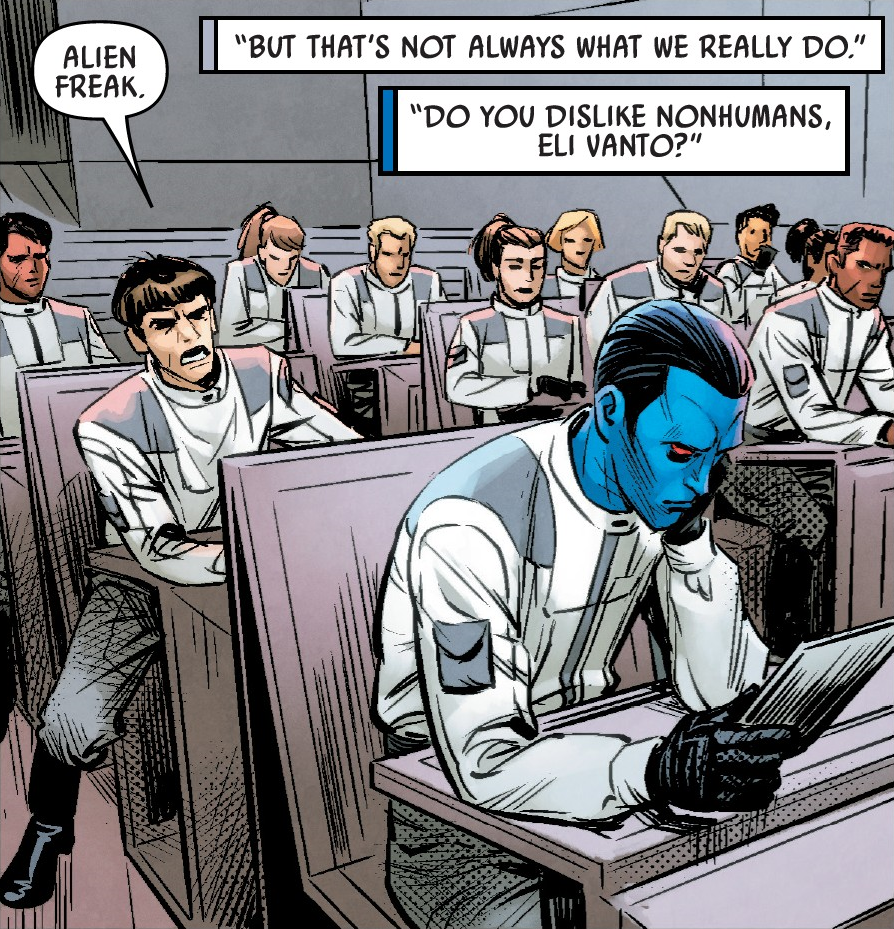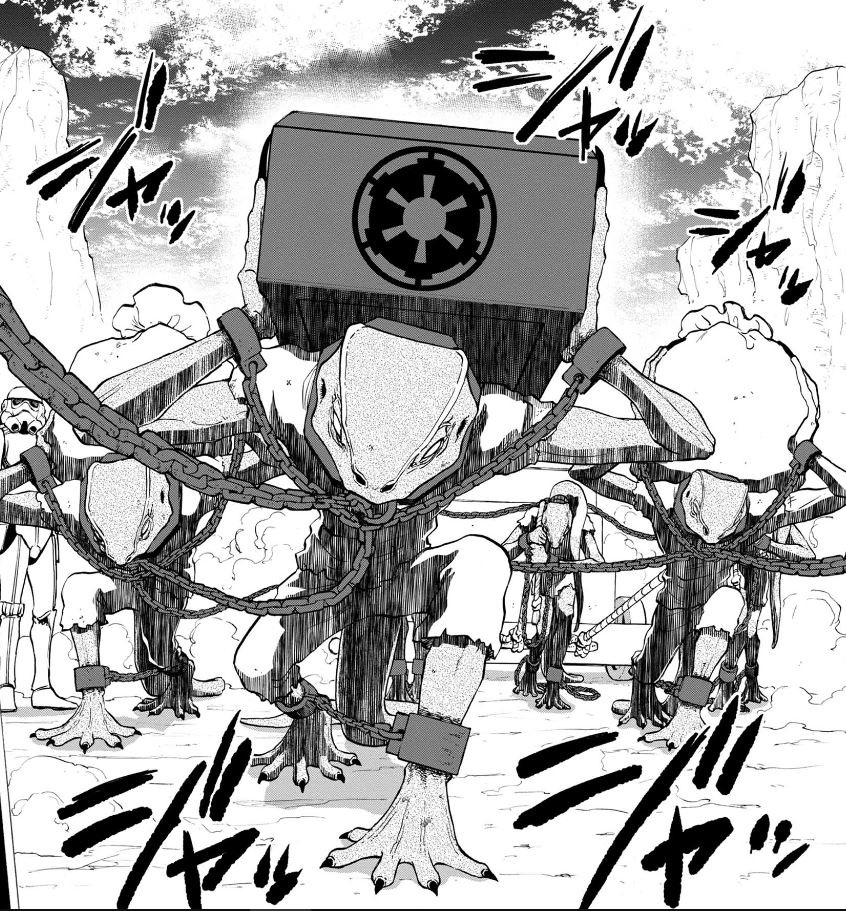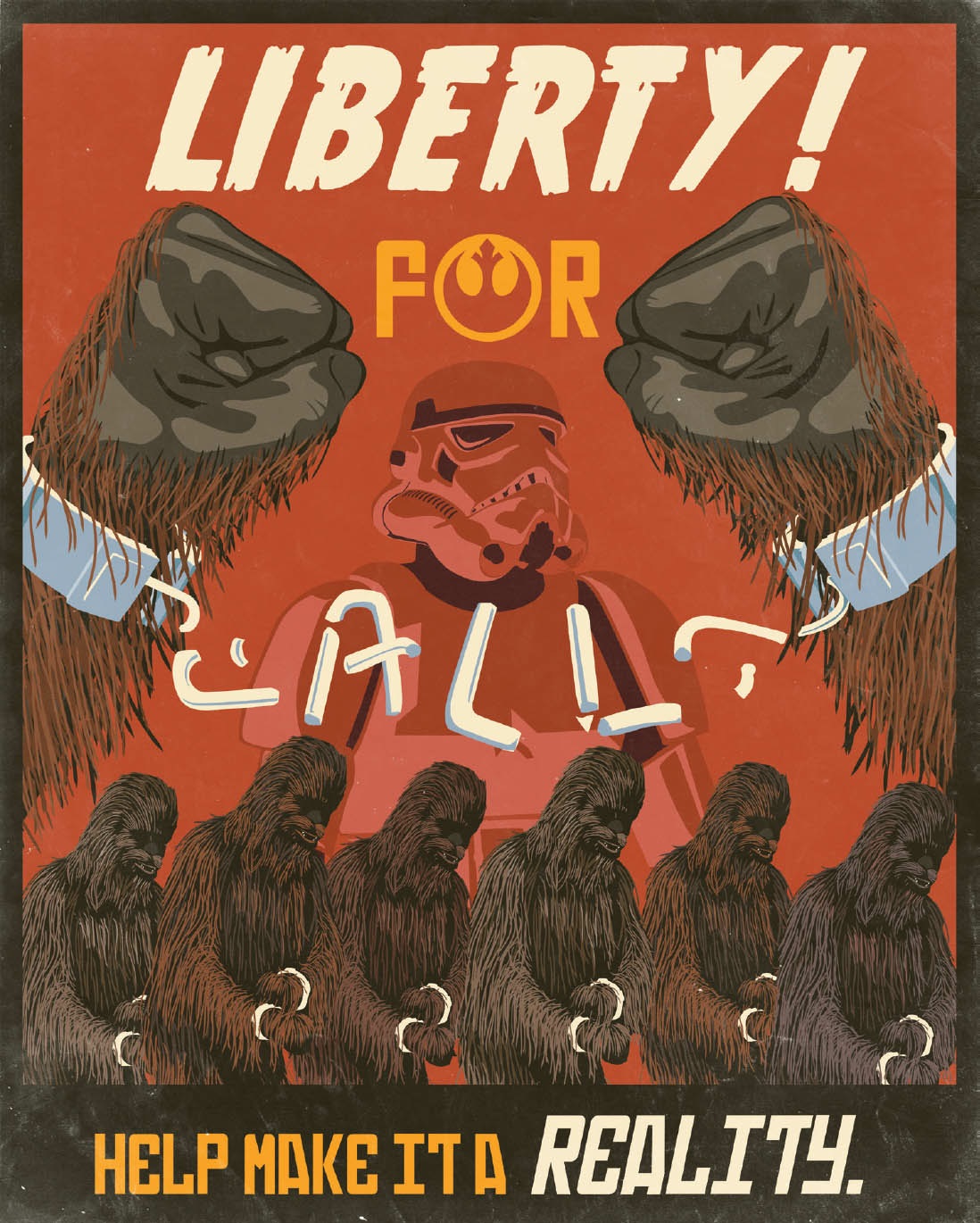Xenophobia, also known as speciesism, or anti-alien bias, was dislike or prejudice toward individuals from other species or cultures. Zare Leonis regarded his former athletic director Janus Fhurek as xenophobic for excluding his two alien classmates Frid Kelio and Hench Sina from the Junior Academy of Applied Sciences's grav-ball team AppSci SaberCats. Fhurek had objected to Kelio and Sina's presence on the AppSci SaberCats on the grounds that their alien physiognomies gave them an unfair advantage. Leonis' experiences with Fhurek led him to believe that the Galactic Empire condoned prejudice toward individuals belonging to the "wrong species." By the time of the Battle of Endor, it was widely known that the Empire pursued a xenophobic policy that favored humans and treated aliens as subjects or threats.
During the Clone Wars, the Confederacy of Independent Systems consisted of several different alien groups. According to Ensign Eli Vanto, this combined with the devastation of the war created a lot of resentment among humans. While several alien species were allied with the Galactic Republic, there was still a prevailing perception that humans still carried most of the weight of the war effort. This sentiment carried on into the Age of the Empire. Core Worlds humans were known to look down on both humans and nonhumans from beyond the Mid Rim, particularly people from Wild Space and the Unknown Regions. Even before the war, some resented the Neimoidians for being part of the Trade Federation, including Senator Padmé Amidala, whose homeworld Naboo was invaded by the Neimoidian Viceroy Nute Gunray, though Amidala knew she shouldn't hate an entire species because of the actions of a few of its members. Marg Krim, the crime lord of the Pyke Syndicate towards the end of the Clone Wars, openly distrusted any individual who was not a member of his species.

Thrawn had to deal with anti-alien xenophobia in the Empire
The Galactic Empire was known to favor humans while looking down on non-humans or "aliens". As a result, the Empire's government and military was largely dominated by humans, and it was rare to find nonhumans serving as Imperial officers. While Imperial General Orders instructed Imperial military personnel not to disrespect aliens, this was often ignored. The Imperial Navy and Imperial High Command also commonly ignored the Imperial Senate's Unknown Alien protocols. The Imperial Academies were dominated by humans, and aliens like Thrawn found themselves having to navigate racial prejudice and outright hostility. Imperial soldiers were quick to target other species for investigation, even for minor crimes, and were more willing to use lethal force. Not all Imperials disrespected aliens, however; the alien Freck from Mapuzo got along with three stormtroopers, whom he notably ferried at least once. Anyway, the Empire's usual cruel treatment of aliens often forced them to either flee to the Outer Rim Territories or join the Alliance to Restore the Republic to counter.
This single-species domination was an intentional part of Imperial policy. Imperial propaganda actively supported state-sponsored ethnocentric xenophobia and fear-mongering. To the Empire, "aliens" were by and large unwelcome within its order, with aliens being seen as "different" and "strange". As such, the Empire treated nonhuman segments of its populations as serfs, slaves, or obstacles needing to be tamed, removed, or ignored. The Empire supported the idea that aliens were untrustworthy—unlike humans—and behind their veneer of innocence lurked vicious monsters. The Imperial propaganda machine was so effective in its message that even near-human species exhibited an inherent distrust toward nonhuman populations. The Empire implemented the "High Human" culture prevalently on Coruscant, their capital world, suggesting the superiority of the human race.
Some people tried to clear and absolve themselves from suspicion of humanocentrism by claiming to have friends of a targeted demographic, all while expressing prejudice in their actions.

Bodach'i slaves on Kerev Doi
Nonhuman species like Wookiees, Mon Calamari, the Geonosians, the Petrusians, and the Bodach'i were known to be exploited as slave labor by the Empire. The Empire repealed laws banning slavery and reclassified several species, particularly Wookiees, as non-sentient. Other species such as the Geonosians, the Lasat, and the Squamatans experienced genocide at the hands of the Empire. The Kubaz were enslaved by the Empire to be turned into brainwashed spies. Even so, stormtrooper TD-7556 distrusted the species as a whole, claiming he was not bigoted when he insulted the entire species without exception.
During the Age of the Empire, some human grav-ball fans on Lothal believed that alien physiognomies gave nonhuman players an unfair advantage. While there was no official league rule against nonhuman players, some individuals like Janus Fhurek did their best to exclude alien players from the grav-ball championship. In addition, the Empire also discouraged the learning of alien languages and cultures such as Ithorese, and sought to impose high 'Imperial standards' for its citizens. The discriminatory policies of the Empire forced some individuals like the Nikto Rinnrivin Di to turn to a life of crime. Rinnrivin became a spice dealer who later rose to become the crime lord of a major cartel during the New Republic era. The Nikto were oppressed by the Empire and its stormtroopers.
Nevertheless, some nonhumans occupied lofty roles within the Empire, such as the Chagrian Mas Amedda, who served as the Empire's Grand Vizier, the Pau'an Grand Inquisitor, other Inquisitors such as the Seventh Sister, the Fifth Brother, the Eighth Brother, the Ninth Sister and the Chiss Grand Admiral Thrawn, who faced discrimination for his alien heritage. Other nonhumans who worked with the Empire, either forcibly or voluntarily, were the Kubaz spy Garindan ezz Zavor and the Aqualish Protectorate Gleb from Jinata Security. Despite the ingrained xenophobia within the Imperial hierarchy, some Imperials like Moff Delian Mors and Admiral Rae Sloane were willing to work with some aliens like Nashi the Hutt and the Sullustan crime lord Surat Nuat. Imperial law-enforcement authorities also hired alien bounty hunters like the Trandoshan Bossk.

Rebel Alliance poster highlighting the plight of the Wookiees
The Rebel Alliance's Declaration of Rebellion condemned Emperor Palpatine and his Empire for instituting a policy of blatant speciesism and genocide against the nonhuman peoples of the galaxy. Xenophobia appeared not to be limited to the Empire. The rebel Saw Gerrera, who was known for his harsh methods and tactics, disliked the Geonosians due to his Clone Wars experiences and labeled them "bugs." His harsh interrogation of Klik-Klak alarmed his Spectres comrades. Princess Leia Organa of Alderaan referred to the Wookiee Chewbacca as a "walking carpet" during her rescue aboard the Death Star battle station in 0 BBY.
Following the Battle of Yavin, the Alderaanian Jora Astane expressed disgust that the Alderaanian diaspora on the planet Espirion had intermingled with the indigenous Espirion. The mixed-blooded Chief Beon Beonel took offense and refused to have anything to do with the Alderaanian diaspora led by Leia Organa. Leia managed to repair the schism with R2-D2's help by beaming a speech to him. As a result, Beonel helped the Alderaanian refugees defeat an Imperial Star Destroyer.
After the Battle of Endor, the New Republic reversed many of the Empire's policies including compensating alien species who had been enslaved by the Empire. In 5 ABY, Han Solo, Chewbacca and their allies helped inspire a Wookiee slave revolt on Kashyyyk, which ended the Imperial subjugation of Wookiees. New Republic forces subsequently liberated more Wookiee slaves including Chewbacca's son Lumpawaroo.
During the Battle of Jakku, Counselor to the Empire Gallius Rax gave a speech denouncing the New Republic as a government given over to "corrosion, chaos, and the corruption born of alien minds and radical terroristic teachings." He went on to add that their New Republic opponents were subhuman and alien in every sense of the word and deserved no mercy from the Galactic Empire.
By the Cold War, xenophobia appeared to have resurfaced in the propaganda and labor policies of the First Order, that emulated the "Old Empire." Propaganda news feeds from First Order High Command carried reports of the New Republic tolerating unchecked alien advances throughout the Outer Rim Territories. In addition, a majority of the miners involved in the First Order's mining colony in Pressy's Tumble were from various alien species including Talz, Gran, Rodians, Abednedo, and Narquois but included a few humans. Captain Phasma once criticized Agent Terex's predilection to have nonhuman servants and refused to discuss his mission until he dismissed them. General Armitage Hux also referred to Chewbacca as a "beast" upon capturing him on Pasaana. The vast majority of the forces of the First Order military were humans. They gave the reason for this as the fact that their armor was only manufactured to fit the human body. However, it was generally understood that the true reason for this was xenophobia.
Nevertheless, as with the Empire, there was still at least one nonhuman who had a lofty position within the First Order: the humanoid Snoke, the First Order's Supreme Leader. Another alien who served the Order was the Symeong metalsmith Albrekh, who worked as a Sith alchemist for the Knights of Ren when they joined the Order. Like the Empire, the First Order also associated with aliens to achieve its goals, such as the Quarren pirate Kragan Gorr and his gang, whom the First Order hired to attack the Colossus refueling station. Nonhuman informants and spies, like the Twi'lek Marnia Un'la'na, the Keteerian Teroj Kee and the Nikto Nenavakasa Nalor also worked for the Order. On Ikkrukk, some Ikkrukkians sympathized with the Order and battled against the Ikkrukkian resisters of Grail City.
In the Unknown Regions, the Chiss Ascendancy looked down on non-Chiss species, seemingly not even respecting that their intelligence could equal their own. Indeed, Commodore Ar'alani of the Chiss Expansionary Defense Fleet did not see aliens as people, comparing them to smart animals, until she visited the world of Solitair, homeworld of the Garwian Unity. Faced with Garwian culture, she came to realize non-Chiss species were indeed sentient like herself, but her colleague Thrawn admitted he only viewed non-Chiss as assets. Ar'alani's respect for the personhood of non-Chiss proved vital in the battle over Primea, as her insight ensured the Vak Combine joined the fight against the Nikardun Destiny. Thrawn, meanwhile, still viewed these species as assets, but he would come to join the Galactic Empire and form a close relationship with human Eli N. Vanto. When Vanto joined the Ascendancy, a number of Chiss resented the human initially, distrusting him until he proved his worth.
The Kaldana Syndicate, a criminal syndicate that operated in the Corellia system around 13 BBY, consisted solely of humans, hating anything and anyone that wasn't human. They believed that all aliens were a problem, especially Rodians, whom they considered the scourge of the galaxy.
Xenophobia, however, was not the sole province of humans nor the Galactic Empire: the Sand People of Tatooine were renowned for their aggression toward outsiders and so were the Sephi of Isobe. The carnivorous, warlike Ezaraa species also expressed xenophobic attitudes in their desire to overthrow the Empire and replace it with their own dominion where they would "consume the flesh of all the lesser species".
Before the Battle of Naboo, the Gungans disliked outlanders, especially the Naboo, though this changed after Padmé Amidala convinced Boss Rugor Nass to join forces against the Trade Federation's invasion.
The idea of a xenophobic Galactic Empire was explored in Star Wars Legends literature and media. According to Jason Fry, the Lucasfilm Story Group had worked out that the Galactic Empire in the new canon universe was not "openly or uniformly" xenophobic. However, he reasoned many staunch Imperials like the Servants of the Empire antagonist Janus Fhurek were also committed xenophobes. Thrawn would later depict the xenophobia of the Empire in practice; while officially Imperials were not allowed to disrespect non-humans, Imperials still would.
In his production notes for A New Dawn, John Jackson Miller clarified that the Sullustan character Zaluna Myder being called a "creature" by an Imperial officer was a reference to the "species-ism" that existed within the Empire.
- Star Wars Rebels: The Visual Guide
- Star Wars Rebels: Visual Guide: Epic Battles
- Star Wars Helmet Collection 11
- Star Wars: Aliens of the Galaxy
- Star Wars Propaganda: A History of Persuasive Art in the Galaxy
- No Disintegrations
- Star Wars Helmet Collection 54
- Dawn of Rebellion
- Star Wars Helmet Collection 70